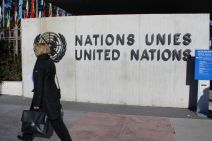World churches leader meets UN rights chief on religious freedom

Freedom of religion and rights of religious minorities is a prime concern of the World Council of Churches, its general secretary, Rev. Olav Fykse Tveit, has told Navi Pillay, the United Nations High Commissioner for Human Rights.
The two met on Jan. 23 at the UN Human High Commissioner's Office in Geneva, Switzerland, the WCC said in a statement on Thursday noting that Tveit spoke of the council's commitment to uphold human rights.
"The issue of freedom of religion and rights of religious minorities has been a prime concern of the WCC. On behalf of our member churches, we speak for the rights of all religions irrespective of their affiliations," said Tveit during the meeting.
Justice should not be secondary to peace, and both should go together, the WCC quoted Pillay saying in comments during her meeting with Tveit, who was accompanied by senior members of the church council's staff.
Tveit explained the work of the WCC, which brings together 347 mainly Anglican, Orthodox and Protestant churches representing around 560 million Christians, alluding to the work of the church body in promoting justice and peace.
These two topics will be a theme at the end of the year in Busan, South Korea, at the upcoming meeting of the WCC's highest governing body, its general assembly which gathers about once every seven years.
Pillay, a former South African judge, acknowledged the role of the WCC in helping in the drafting of the Universal Declaration of Human Rights following the Second World War, noting it was influenced by Christian values and principles.
The WCC said she called the council a valued partner of the UN in promoting the universality of human rights and its practical applications.
The WCC Commission of the Churches on International Affairs played an important role during the process of drafting the Universal Declaration of Human Rights, which was adopted in 1948.
The commission also contributed to development of the principle of freedom of religion and drafting Article 18 of the human rights declaration, a guarantee of religious freedom which has been widely recognized.
During the meeting the WCC's work on in the area of religious freedom were discussed on the misuse of the blasphemy law in Pakistan and the response to increasing religious intolerance in Nigeria, the statement said.
"While engaged in advocacy on religious freedom and the rights of all human beings, the WCC also uses an interfaith framework for addressing the human rights concerns rather than limiting them to the interests of Christians alone," said Tveit.
Pillay recollected that the UN was in partnership with the WCC in the area of human rights even before the Office of the High Commissioner for Human Rights was established in 2006.
